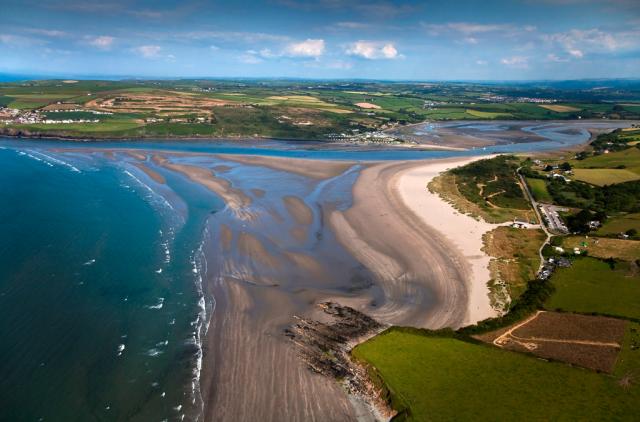Welsh Water has acknowledged its illegal discharge of untreated sewage at numerous wastewater treatment facilities over the course of several years.
This admission followed the presentation of the company’s own data. One of the most problematic facilities is located in Cardigan, in the west of Wales, where Welsh Water has been releasing untreated sewage into an environmentally protected area near a rare dolphin habitat for a minimum of a decade.
Welsh Water has confirmed it is actively addressing these issues and does not contest the analysis, which was provided by mathematician and former professor at University College London, Peter Hammond, representing the campaign group Windrush Against Sewage Pollution (WASP).
In most of the UK, a combined sewerage system is employed, where rainwater and wastewater from toilets, bathrooms, and kitchens are conveyed through the same pipes. Typically, all waste is transported to a sewage treatment facility.
During heavy rainfall, to prevent a facility from becoming overwhelmed, it is permissible to discharge untreated sewage. However, releasing sewage before a facility reaches the overflow level stipulated in its permit constitutes an illegal violation.
Professor Hammond sought data from 11 Welsh treatment plants, and his findings revealed that 10 of them had been discharging untreated sewage when they were obligated to treat it.
The situation in Cardigan was particularly dire, with more than 200 days of sewage discharge each year between 2019 and 2022. The data provided to Professor Hammond demonstrated that Cardigan almost consistently failed to treat the required volume of sewage.
According to its permit, it should have treated 88 liters per second before discharging, but it had unlawfully released untreated sewage for a total of 1,146 days from the beginning of 2018 until the end of May 2023.
“This is the worst sewage works I’ve come across in terms of illegal discharges,” he said.
Upon being confronted with these findings, Welsh Water acknowledged that they currently have approximately 40 to 50 wastewater treatment plants that are operating in violation of their permits. They explained that decisions regarding which plants to upgrade were made with consideration of customer bills, and they emphasised that the spills into the Cardigan estuary had been assigned a low priority due to the absence of any discernible environmental impact.
The discharge point from the Cardigan treatment plant flows into the Teifi estuary, and Welsh Water cited Poppit Sands, a designated bathing beach located two miles away, as a point of reference. They highlighted that the water quality at Poppit Sands consistently receives an “excellent” rating.
Environmental organizations have pointed out that testing at Poppit Sands occurs solely between May and September, with no ongoing assessment of the consequences of sewage discharges into the River Teifi. This river is designated as a Special Area of Conservation (SAC) and provides a habitat for lampreys, Atlantic salmon, and otters. Furthermore, the Teifi River ultimately flows into Cardigan Bay, which hosts one of Europe’s largest bottlenose dolphin populations.
Gail Davies-Walsh of rivers campaign group Afonydd Cymru said: “Untreated sewage causes a host of problems on our rivers,”.
“High nutrient levels coming from sewage lead to algal blooms that lead to the depletion of oxygen in our rivers. And that clearly has knock-on impacts to our fish populations and to other species.”
The regulatory authority, Natural Resources Wales, stated that it has known of the problems in Cardigan for eight years and has issued enforcement notices, although no penalties have been imposed thus far. They have indicated that they are currently reviewing data from 101 treatment plants operated by Welsh Water that have been discharging sewage before reaching their permitted capacity.
In response, Welsh Water, a not-for-profit organization, clarified in a subsequent email that it is not subject to a “formal investigation.” They asserted that NRW’s statistics are “inaccurate” and reiterated their stance, maintaining that there are approximately 45 treatment plants presently in violation of their permits.
Cardigan’s issues can be traced back to 2004 when Welsh Water introduced a unique wastewater treatment system that employs a membrane for sewage filtration, which differs from the conventional approach adopted by most sewage plants.
The sewage infrastructure in Cardigan is antiquated and prone to leaks, particularly during Spring tides when saltwater infiltrates the pipes and the treatment facility.
This influx of saltwater triggers the release of enzymes by bacteria, leading to the obstruction of the membrane. Consequently, the plant consistently struggles to adequately process the requisite volume of sewage, resulting in the discharge of untreated sewage.
Steve Wilson, managing director for wastewater services at Welsh Water said: “We’re not proud of this at all,”
“It’s a very uncomfortable position to be in – but it’s not for the want of trying. We have been trying to fix this.”
Despite attempts to rectify the situation, the previous measures have proven ineffective. As of 2025, construction is scheduled to commence on a new treatment facility for Cardigan, with an estimated cost of £20 million.
Gail Davies-Walsh from Afonydd Cymru now has inquiries directed at both the water company and the regulatory body, Natural Resources Wales, which holds the responsibility for permit enforcement and, when warranted, the imposition of penalties.
She says: “Fundamentally this site [Cardigan] has been discharging raw sewage for possibly 10 years and no action has been taken,”




















